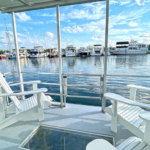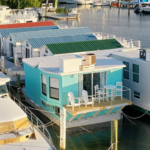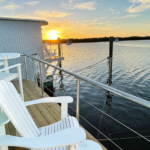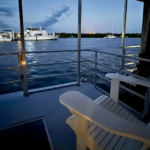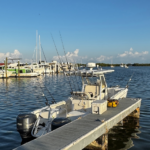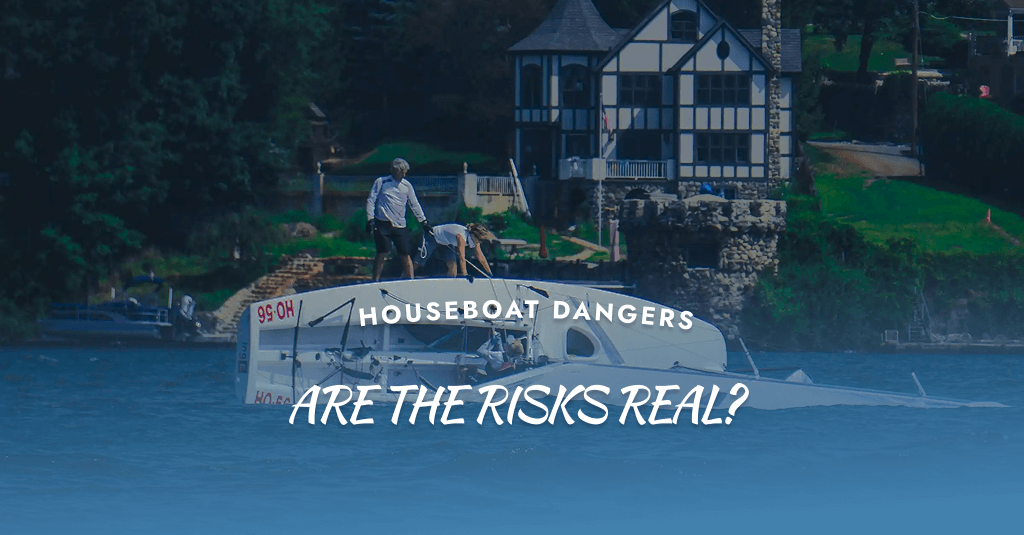
Houseboat Dangers: Are the Risks Real? Safety Tips Inside
Houseboats offer a serene and unique lifestyle, combining the comforts of home with the calm of open waters. Whether used for weekend getaways, vacations, or even full-time living, they provide a peaceful retreat. But with that tranquility comes a pressing concern many potential owners ask: Are houseboats dangerous?
This article explores houseboat dangers in detail from weather and fire risks to structural issues and safety preparedness. If you’re considering living on or investing in a houseboat, understanding these risks and how to manage them is essential for both safety and peace of mind.
Understanding Houseboat Dangers: The Basics
Any form of transportation or unconventional living space comes with its own safety risks, and houseboats are no exception. Unlike homes on land, these floating dwellings are exposed to environmental factors that can quickly become hazardous without the right safety systems in place.
Common houseboat dangers include:
-
Capsizing and sinking.
-
Fires and gas leaks.
-
Carbon monoxide exposure.
-
Electrical hazards.
-
Severe weather.
-
Mold and poor air quality.
-
Falls and drowning risks.
Fortunately, modern houseboats are designed with safety in mind, and the vast majority of these risks can be mitigated with proper maintenance, equipment, and awareness.
1. Capsizing and Sinking
One of the first concerns people have about houseboat dangers is whether the boat can sink or tip over. While the visual of a sinking houseboat can be alarming, it’s important to understand that modern designs focus heavily on stability.
What Increases the Risk?
-
Poor weight distribution or overloading.
-
Structural damage to the hull.
-
Severe leaks from poor maintenance.
-
Docking in unprotected, rough waters.
Precautions to Take:
-
Never overload the houseboat beyond its rated capacity.
-
Have the hull inspected regularly.
-
Use bilge pumps and leak detection systems.
-
Dock in calm, secure marinas.
2. Fire Hazards and Gas Leaks
Due to onboard propane systems, cooking appliances, and generators, fire is one of the most serious houseboat dangers. A small spark in a confined, flammable space can escalate rapidly.
Common Fire Risks:
-
Leaking propane tanks.
-
Faulty electrical wiring.
-
Cooking unattended.
-
Overloaded circuits.
How to Stay Safe:
-
Install smoke detectors and fire extinguishers.
-
Regularly inspect and maintain propane systems.
-
Keep fire blankets in kitchens and engine areas.
-
Use marine-grade electrical systems.
3. Carbon Monoxide Exposure
Carbon monoxide (CO) is a colorless, odorless gas that can be fatal in enclosed spaces. On houseboats, CO is typically emitted by engines, generators, or fuel-burning appliances.
Risks of CO Poisoning:
-
Operating engines while docked or in enclosed slips.
-
Poorly ventilated cabins.
-
Faulty exhaust systems.
Preventive Measures:
-
Install carbon monoxide detectors in all enclosed areas.
-
Ventilate the boat properly at all times.
-
Avoid running engines while the boat is stationary.
Being unaware of carbon monoxide exposure is one of the most overlooked houseboat dangers, and prevention is key.
4. Electrical Hazards
Water and electricity are a dangerous combination. Faulty electrical systems are a major cause of both fire and electrocution on houseboats.
Main Causes:
-
Substandard wiring or DIY modifications.
-
Corroded outlets and wires.
-
Overloaded power supplies.
How to Minimize Risk:
-
Use marine-certified electricians.
-
Install GFCI (Ground Fault Circuit Interrupter) outlets.
-
Perform yearly inspections of the electrical system.
A professional inspection can go a long way in minimizing houseboat dangers associated with electrical faults.
5. Weather and Water Conditions
While houseboats are designed for stability in calm waters, rough weather, storms, or flooding can create serious threats to safety.
Environmental Hazards Include:
-
Storm surges and strong winds.
-
Heavy rain causing flooding.
-
Lightning strikes.
Safety Guidelines:
-
Monitor weather forecasts closely.
-
Use strong, well-maintained mooring lines and fenders.
-
Avoid traveling during adverse weather conditions.
Preparing for extreme weather in advance is a vital part of reducing potential houseboat dangers during storm seasons.
6. Mold, Mildew, and Air Quality
Poor ventilation on a houseboat can lead to moisture buildup, resulting in mold and mildew. Over time, this can affect both structural integrity and health.
Health Risks:
-
Respiratory issues.
-
Allergies and skin irritation.
-
Weakened immune systems in long-term exposure.
Preventive Tips:
-
Use dehumidifiers, especially in humid climates.
-
Ensure proper air circulation.
-
Regularly inspect and clean surfaces prone to dampness.
This is one of the slow-developing but persistent houseboat dangers that can go unnoticed without regular upkeep.
7. Slip and Fall Injuries
Decks can become slippery from water, algae, or debris, increasing the chances of slips, falls, and even drowning.
Contributing Factors:
-
Wet or mossy decks.
-
Lack of guardrails or lighting.
-
Cluttered walkways.
Prevention:
-
Install anti-slip mats and railings.
-
Keep decks clean and clutter-free.
-
Use adequate lighting at night.
Simple upgrades can prevent some of the most common houseboat dangers related to falls and physical injury.
8. Drowning Risks
Living on water naturally comes with the risk of drowning, particularly for children, pets, or individuals who cannot swim.
Reducing the Risk:
-
Life jackets should always be available and worn when needed.
-
Install safety gates or nets if children are on board.
-
Supervise swimming activities closely.
Drowning remains one of the most serious houseboat dangers, but it is almost entirely preventable with the right precautions.
Houseboat Safety Essentials
To safeguard against the most common houseboat dangers, certain safety tools and routines are critical:
Must-Have Equipment:
-
Life jackets and throwable flotation devices.
-
Smoke and CO detectors.
-
First-aid kit.
-
Fire extinguishers (marine-grade).
-
Emergency radio or VHF.
-
Navigation and weather alert systems.
Routine Safety Practices:
-
Conduct regular safety drills.
-
Maintain a safety checklist for every trip or season.
-
Keep all emergency gear accessible and functional.
Are Houseboats Dangerous for Children and Pets?
Houseboats can be safe for families with children and pets, but it takes extra planning.
Safety Tips for Kids and Pets:
-
Always supervise outdoor play.
-
Use non-slip surfaces.
-
Add barriers or nets around decks.
-
Keep pet life vests on board.
Children should also be taught basic water safety, and pets must be trained to avoid jumping overboard. With care, these vulnerable groups can enjoy houseboat life safely.
Can You Minimize Houseboat Dangers with Insurance?
Yes. Investing in the right houseboat insurance plan can help you recover from accidents, theft, or natural disasters. Look for policies that cover:
-
Fire and storm damage.
-
Mechanical and electrical failure.
-
Personal property loss.
-
Liability coverage.
Proper insurance provides peace of mind and adds a financial layer of protection against unforeseen houseboat dangers.
So, are houseboats dangerous? They can be but only if you ignore the essential precautions. The reality is that with proper equipment, regular maintenance, and safety planning, most houseboat dangers can be minimized or even eliminated.
From carbon monoxide exposure and storms to slips and falls, understanding the risks is the first step toward responsible houseboat ownership or rental. With a few safety upgrades and a little common sense, living on a houseboat can be just as secure as living in a land-based home.
Frequently Asked Questions (FAQs)
What are the most common houseboat dangers to be aware of?
The most common houseboat dangers include fire hazards, carbon monoxide exposure, electrical issues, slips and falls, and storm-related damage. These risks can be greatly reduced with regular maintenance and safety equipment.
Are houseboats safe during bad weather or storms?
Houseboats are generally safe when docked in protected areas, but bad weather can pose significant risks. Wind, waves, and lightning are serious houseboat dangers if the vessel isn’t properly moored or prepared.
Can children and pets live safely on houseboats?
Yes, with the right safety measures in place. Barriers, life vests, anti-slip surfaces, and adult supervision help minimize houseboat dangers for children and pets on board.
How can I prevent fire and gas-related houseboat dangers?
To prevent fire and gas-related houseboat dangers, you should regularly inspect propane systems, install smoke and CO detectors, and keep fire extinguishers on board. Always use marine-certified appliances and wiring.
What safety equipment helps reduce houseboat dangers?
Key equipment includes life jackets, fire extinguishers, carbon monoxide detectors, emergency radios, and bilge pumps. Keeping this gear in working order is essential to managing houseboat dangers effectively.

